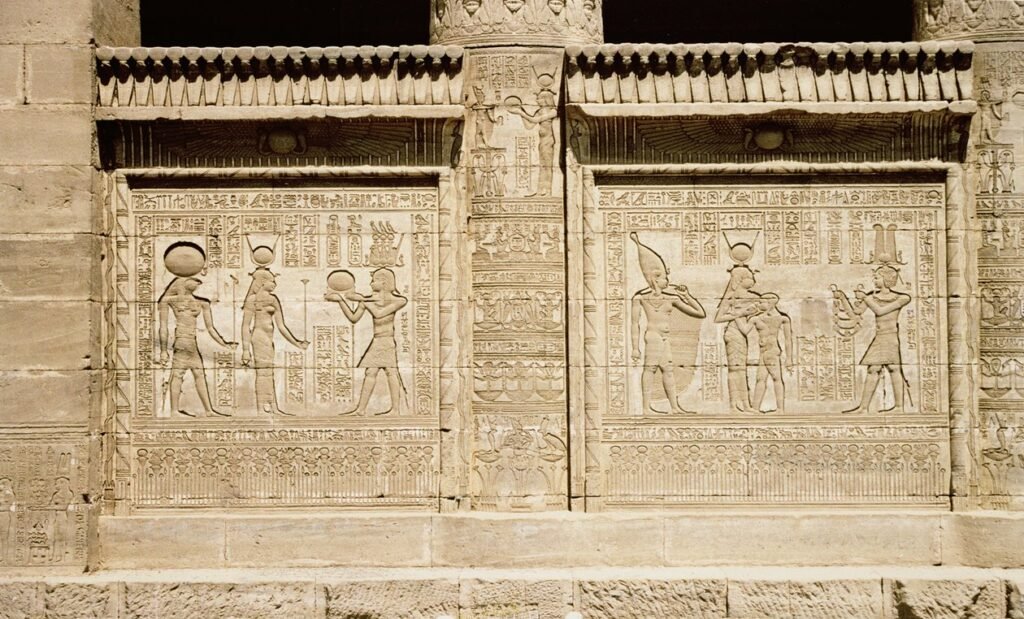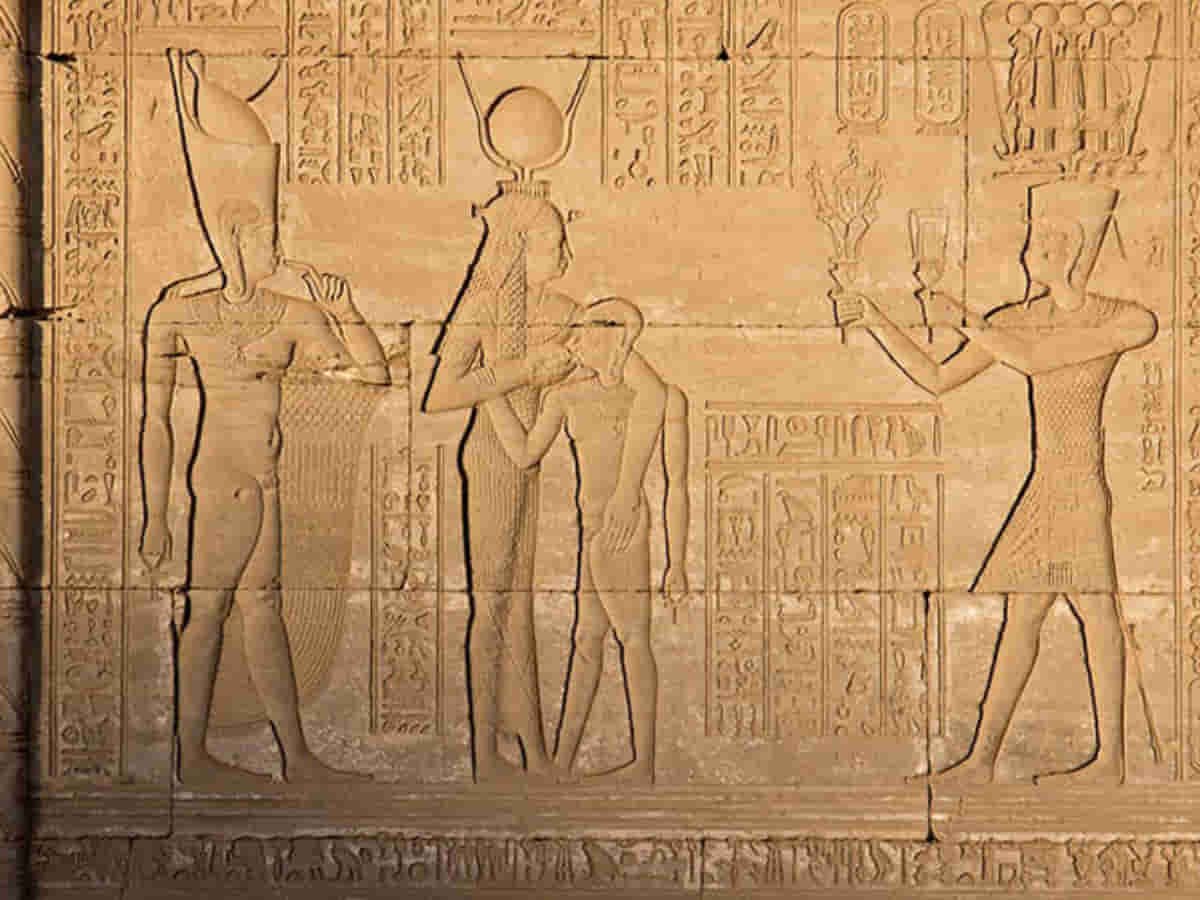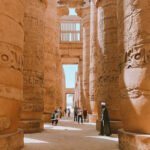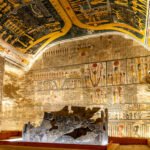Ihy, the Egyptian god of music, occupies a special place in the pantheon of ancient deities, embodying the vibrant spirit of celebration, music, and divine joy.
Revered for his power to bridge the mortal and divine realms through the sistrum, Ihy played an integral role in Egyptian religious rituals. His unique connection to the goddess Hathor and the god Horus further elevated his status, making him a symbol of life’s renewal and the uplifting force of music.
In this article, we’ll explore Ihy’s fascinating role in ancient Egypt, his representation in temples, and how his influence resonates in Egyptian history. Whether you’re planning a trip to Egypt or are deeply intrigued by Egyptology.
Who Was Ihy?
Ihy, an ancient Egyptian god, holds a unique place in the rich pantheon of Egyptian deities. Known primarily as the god of music and joy, Ihy was closely associated with sound, celebration, and the vibrant life force embodied in festivals and religious ceremonies. His name, Ihy, is often pronounced as “Ee-hee,” with its meaning translating to “Sistrum Player” or “Musician.
” The sistrum, an ancient musical instrument, played a crucial role in Egyptian religious rites, particularly those dedicated to his mother, the goddess Hathor. Ihy is the divine offspring of Hathor and Horus, both central figures in Egyptian mythology, which further elevated his status within the Egyptian belief system.
Travelers interested in the multifaceted nature of Egyptian deities will find that Ihy’s role ties closely to the everyday spiritual and festive life of the ancient Egyptians, representing youth, vibrancy, and the power of joyful expression.
If you’re intrigued by ancient Egyptian gods and want to explore their origins, consider booking a guided tour with Shiny Egypt Tours for a deep dive into Egypt’s rich history and mythological tapestry.

Ihy’s Role in Ancient Egypt
Ihy’s role in ancient Egypt was intricately connected to music, joy, and festivity, but his significance went beyond mere celebration. He symbolized the renewal of life, the cyclic nature of existence, and the ability of music to transcend the earthly and connect with the divine.
In ceremonies held in honor of Hathor, Ihy played a pivotal role as his presence was believed to evoke the musical sounds of the sistrum, an instrument vital to these rituals.
As the Egyptian god of music, Ihy was not only revered in temples but also in personal devotion, representing the joy of life that music brings. Additionally, Ihy’s divine powers were considered instrumental in protecting the realms of fertility, love, and music, ensuring harmony between gods and men.
Visiting the temples of Dendera and other sacred sites where Ihy Egyptian god was worshiped offers a first-hand glimpse into these powerful ceremonies. Let Shiny Egypt Tours guide you through the sacred spaces that honored Ihy and other deities, enriching your understanding of ancient Egyptian religious practices.
Ihy and the Sistrum
One of the most distinctive aspects of Ihy’s identity is his association with the sistrum, a sacred instrument used in Egyptian religious rituals.
The sistrum was believed to ward off evil spirits and invoke the presence of deities, making it central to worship, particularly in ceremonies dedicated to Hathor, Ihy’s mother. Ihy is often depicted holding or playing the sistrum, emphasizing his role as the god of music and joy.
The sound of the sistrum was not only a call to the divine but also a symbol of creation and rebirth, linking Ihy to the ongoing cycles of life. The rhythmic shaking of the instrument represented the harmony between the physical and spiritual worlds, with Ihy acting as a conduit between them.
For travelers interested in exploring the symbolic importance of Ihy and the sistrum in ancient Egyptian culture, Shiny Egypt Tours offers exclusive guided visits to temples where these instruments and gods were honored, enhancing your understanding of Egypt’s rich religious heritage.
The Representation of Ihy in Ancient Egyptian Temples
Ihy’s depiction in ancient Egyptian temples is both fascinating and telling of his importance in the religious and cultural life of Egypt. Often portrayed as a young child, Ihy is seen holding a sistrum, smiling, and brimming with youthful energy.
This childlike representation highlights his embodiment of renewal, joy, and innocence. His youthful demeanor contrasts with the often stern and authoritative depictions of other gods, reinforcing his connection to festivity and celebration. In many temple reliefs, he is shown alongside Hathor, emphasizing his role as her son and his participation in the sacred rites dedicated to her.
Visitors to Egypt can still witness these representations carved into the walls of temples like Dendera, where Ihy’s imagery is preserved. Join Shiny Egypt Tours for a guided exploration of these ancient sites, where you can see for yourself how Ihy was honored and revered in Egyptian worship.
The Mammisi of Ihy at the Temple of Hathor, Dendera
One of the most significant locations dedicated to Ihy is the Mammisi at the Temple of Hathor in Dendera. The Mammisi, or “birth house,” was a structure dedicated to the divine birth of gods, and Ihy was central to the mythology surrounding Hathor’s motherhood.
The Mammisi at Dendera showcases reliefs and carvings that depict the divine birth of Ihy, celebrating his arrival as a god of music and joy.
This structure symbolizes the regeneration of life and the nurturing power of Hathor, reinforcing Ihy’s position within the Egyptian pantheon. The imagery in the Mammisi emphasizes his role as a divine child, born to bring happiness and harmony through music.
For those fascinated by the architectural and symbolic richness of Egypt’s sacred sites, a visit to the Temple of Hathor and the Mammisi of Ihy is a must. Experience this ancient history first-hand by booking your tour through Shiny Egypt Tours, and walk through the very halls where Ihy was venerated.
Final Thoughts on Ihy, the Egyptian God of Music
Ihy, though less widely known than other Egyptian gods, played a vital role in the religious and cultural life of ancient Egypt. As the Egyptian god of music and joy, his presence in festivals, ceremonies, and daily life highlighted the importance of celebration, sound, and spiritual connection.
His association with the sistrum, a key religious instrument, and his relationship with Hathor positioned him as a beloved and significant figure in both personal and state-sponsored worship.
Travelers to Egypt in 2025/2026 have a unique opportunity to delve deeper into the fascinating world of Ihy by visiting the temples and sacred sites where he was honored. To truly experience the magic of Egypt and its ancient gods, book your tour with Shiny Egypt Tours today and explore the land of the pharaohs with expert guides who bring history to life.






